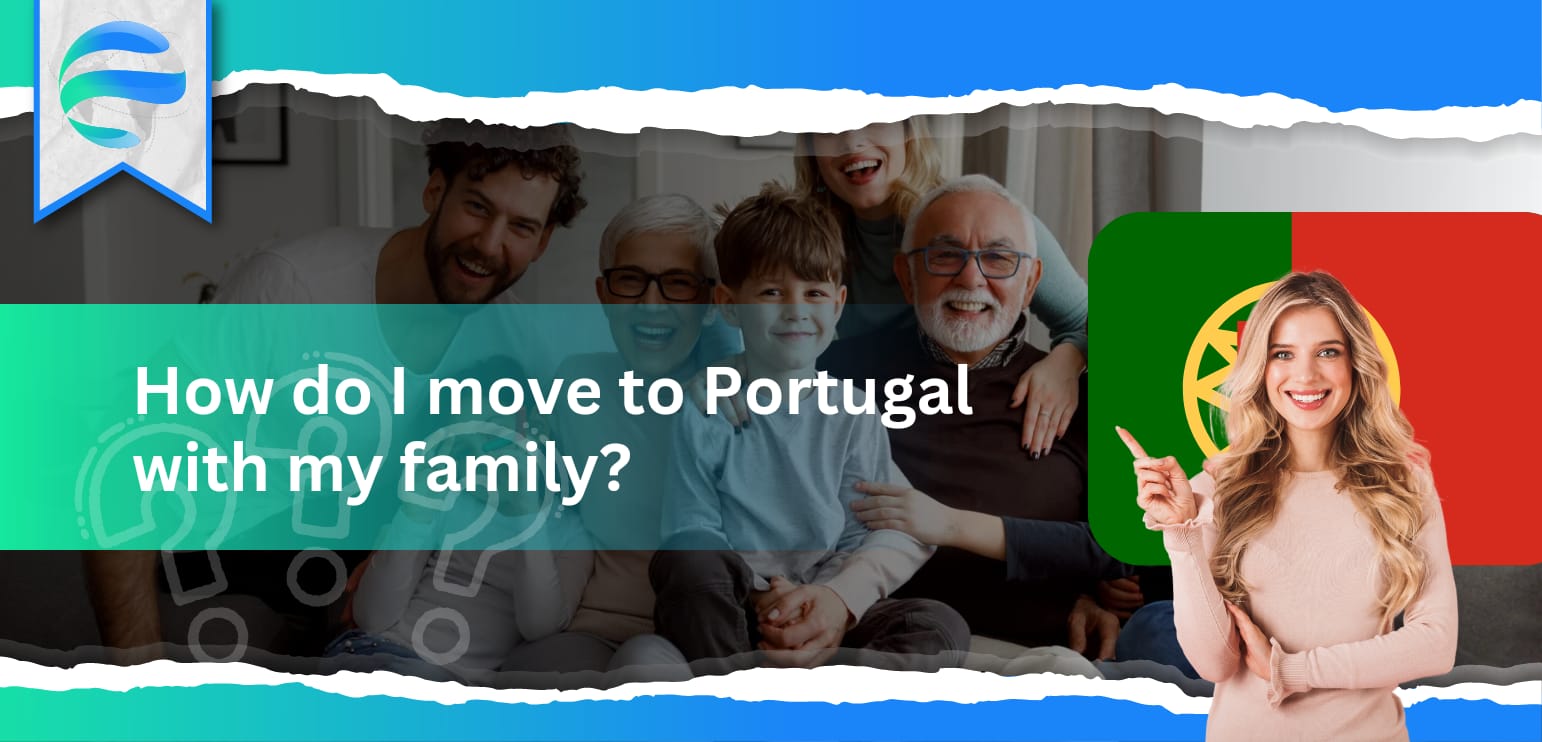
Table of Contents
⟢ How Do I Move to Portugal with My Family?
⟢ Why Choose Portugal for Your Family?
1. Choosing the Right Visa for Your Family
2. Applying for Residency Permits
3. Finding Accommodation
4. Enrolling Your Children in School
5. Accessing Healthcare
6. Navigating Daily Life and Integration
7. Understanding Tax Obligations
⟢ Final Thoughts
⟢ How Do I Move to Portugal with My Family?
Moving to a new country is an exciting adventure filled with opportunities, and Portugal is one of the most appealing destinations for families considering relocation. Known for its beautiful landscapes, warm climate, high quality of life, and welcoming culture, Portugal has become a popular choice for expats from all over the world. If you’re planning to move to Portugal with your family, this guide will provide a comprehensive overview of the process, from choosing the right visa to settling into your new home.
⟢ Why Choose Portugal for Your Family?
Before diving into the logistics of moving, it’s worth considering why so many families are drawn to Portugal:
• High Quality of Life: Portugal is ranked among the best countries in Europe for its quality of life. The country offers a pleasant climate, excellent healthcare, and a strong education system, making it an ideal destination for families.
• Affordable Living: Compared to other Western European countries, the cost of living in Portugal is relatively low. Housing, food, and transportation costs are more affordable, allowing families to enjoy a comfortable lifestyle.
• Safety: Portugal consistently ranks as one of the safest countries in the world, offering peace of mind for families.
• Welcoming Environment: The Portuguese are known for being warm and friendly, making it easier for expat families to integrate into the community.
With these factors in mind, let’s explore how to move to Portugal with your family.
1. Choosing the Right Visa for Your Family
The first step in moving to Portugal is determining the type of visa that best suits your situation. Portugal offers several visa options for individuals and families looking to relocate:
a. D7 Visa (Passive Income Visa)
The D7 visa is one of the most popular options for families who have passive income sources, such as pensions, rental income, or investments. This visa is ideal for retirees and individuals who do not rely on employment in Portugal. To qualify, you’ll need to demonstrate sufficient financial means to support your family during your stay in Portugal.
▪ Requirements: Proof of passive income (typically around €8,460 per year for the primary applicant, with an additional 50% for a spouse and 30% for each dependent child).
▪ Benefits: The D7 visa allows you and your family to live in Portugal and gain access to the country’s healthcare and education systems.
b. Golden Visa (Investment Visa)
The Golden Visa is an attractive option for individuals who are willing to invest in Portugal. By making a qualifying investment, such as purchasing real estate or investing in a Portuguese company, you can obtain residency for yourself and your family.
▪ Requirements: Investment of at least €500,000 in real estate or €350,000 in a qualifying property renovation project. Other investment options include creating jobs or contributing to scientific research.
▪ Benefits: The Golden Visa offers residency with minimal stay requirements, making it a great option for families who may not plan to live in Portugal full-time initially.
c. D2 Visa (Entrepreneur Visa)
If you’re planning to start a business or invest in an existing one in Portugal, the D2 visa could be a suitable option. This visa is designed for entrepreneurs and investors who want to contribute to the country’s economy.
▪ Requirements: A solid business plan, proof of financial means to support your family, and a commitment to establishing a business in Portugal.
▪ Benefits: The D2 visa provides a route to residency for the entire family while allowing you to grow a business in Portugal.
d. Work Visa
If you have a job offer in Portugal, you can apply for a work visa. The work visa allows you and your family to live in Portugal while you are employed by a Portuguese company.
▪ Requirements: A valid job offer from a Portuguese employer, proof of qualifications, and sufficient financial means to support your family.
▪ Benefits: Your family members can join you in Portugal under family all,,, reunification, gaining access to education and healthcare.
2. Applying for Residency Permits
Once you’ve obtained the appropriate visa, the next step is applying for residency permits. After arriving in Portugal, you’ll need to visit the local immigration office (SEF) to apply for your residency permit.
▪ Documents Required: You’ll need to submit your visa, proof of accommodation, financial documents, health insurance, and identification documents for each family member.
▪ Timeline: Residency permits are typically issued for one to two years and can be renewed as long as you continue to meet the requirements.
3. Finding Accommodation
One of the most important aspects of moving to Portugal is finding a suitable place to live. Whether you choose to rent or buy a home, there are plenty of options available in both urban and rural areas.
a. Renting a Home
▪ Rental Prices: Prices vary depending on location, with cities like Lisbon and Porto being more expensive. On average, expect to pay around €800 to €1,500 per month for a family-sized apartment in the city center, with lower costs in rural areas.
▪ Lease Agreements: Lease agreements in Portugal are typically for a minimum of one year. You’ll need to provide proof of income and sometimes a guarantor to secure a rental property.
b. Buying a Home
▪ Real Estate Prices: Portugal offers a range of real estate options, from apartments in the city to traditional homes in the countryside. Prices vary significantly by region, with Lisbon and the Algarve being the most expensive.
▪ Buying Process: The process of buying a home in Portugal is straightforward, with no restrictions on foreign ownership. You’ll need to hire a lawyer to handle the legal aspects of the purchase.
4. Enrolling Your Children in School
Portugal has a well-established education system, with both public and private schools available. As an expat family, you’ll need to decide whether to enroll your children in a public school or an international school.
a. Public Schools
▪ Language: Public schools in Portugal teach primarily in Portuguese, making them a good option if you plan to stay long-term and want your children to integrate into the local culture.
▪ Cost: Public schools are free for residents, including expat families.
b. International Schools
▪ Language: International schools offer instruction in English or other languages and follow international curricula (such as the International Baccalaureate).
▪ Cost: Tuition fees for international schools can range from €5,000 to €20,000 per year, depending on the school.
5. Accessing Healthcare
Portugal has a high-quality healthcare system, with both public and private options available. As a resident, you and your family will have access to the public healthcare system, known as Serviço Nacional de Saúde (SNS).
a. Public Healthcare
▪ Cost: Public healthcare in Portugal is affordable, with most services either free or requiring a small co-payment. As a resident, you’ll be eligible for coverage under the SNS, but you may need private insurance for more specialized treatments.
b. Private Healthcare
▪ Cost: Many expat families choose to supplement public healthcare with private health insurance, which provides faster access to doctors and specialists. Private health insurance can cost between €500 to €2,000 per year for a family, depending on the level of coverage.
6. Navigating Daily Life and Integration
Moving to a new country requires adjustment, and Portugal is no exception. Fortunately, the country’s welcoming culture makes it easier for expats to integrate into the community.
a. Learning the Language
While many Portuguese people speak English, especially in tourist areas, learning Portuguese will help you and your family integrate more easily into daily life. There are many language schools and courses available for expats.
b. Making Friends and Joining Communities
Portugal has a beautiful expat community, especially in cities like Lisbon, Porto, and the Algarve. Joining expat groups, and local clubs, and participating in community events can help you and your family make new friends and build a support network.
7. Understanding Tax Obligations
As a resident of Portugal, you’ll be subject to local tax laws. Portugal offers several tax incentives for expats, such as the Non-Habitual Resident (NHR) scheme, which can reduce your tax burden for up to 10 years.
a. Income Tax
You’ll need to declare your worldwide income in Portugal, but the NHR scheme may allow you to benefit from reduced tax rates on foreign income.
b. Property Taxes
If you buy property in Portugal, you’ll be responsible for paying annual property taxes, known as Imposto Municipal sobre Imóveis (IMI).
⟢ Final Thoughts
Moving to Portugal with your family is an exciting journey that promises a high quality of life, a welcoming community, and a range of opportunities. By choosing the right visa, finding accommodation, enrolling your children in school, and navigating the healthcare system, you can ensure a smooth transition to life in this beautiful country. Whether you’re seeking a new adventure, better opportunities, or a safe and peaceful environment for your family, Portugal is an excellent choice for relocation.















